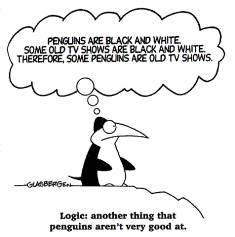Spot the Logical Fallacy
It's time for a round of "Spot the Logical Fallacy." Today's passage comes from the latest article by Dinesh D'Souza, in which he purports to smackdown Richard Dawkins and Sam Harris on the question "If God created the Universe, who created God?"--thereby proving that there is still room in his mouth to accommodate his other foot. Here's the passage:
Given that nothing in the universe is the cause of its own existence, the universe cannot be explained by an infinite regress of causation. If there were infinite regress then the series would not have gotten started in the first place. The universe is here, just like the fellow who has gotten his driver’s license. And just as there had to be a first number at the DMV that got the sequence going, so too there must be a first cause for the universe that accounts for the chain of causation that we see everywhere in the world. We may not be able to say much about what this first cause is like, but we have established the need for it and the existence of it. Without a first cause, none of its effects—including the world, including us—would be here.And remember, folks:
The real force of Aquinas’ argument is not that every series must have a temporal beginning but that every series, in order to have being or existence, must depend on something outside the series. It is no rebuttal to say that since everything must have a cause, therefore God Himself requires a cause. Aquinas’ argument does not use the premise that everything needs a cause. Everything that exists in the universe needs a cause. God is not part of the series and therefore the rules of the series, including the rules of causation, do not apply to Him.
Aquinas can rest easy. It seems evident that Dawkins and Harris have not answered the theistic argument. Yet amusingly they think they have. What’s up with these self-styled paragons of reason? Dawkins and Harris are experts in laboratory science. One is a zoologist, the other a student of neuroscience. Here is the classic case of people who are experts in one field trying to issue authoritative pronouncements in another. When this happens the results are not hard to predict.Do your worst.


















|